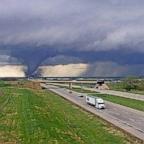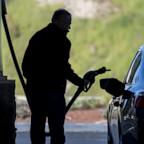Interstate Highway System at a Crossroads; A Crumbling Legacy
DONNERS PASS, Calif., June 29, 2006 — -- A stretch of Interstate 80 between Sacramento and Lake Tahoe, Calif., has been identified as the worst section of the nation's 46,000-mile superhighway system.
"The Interstate is an antique like this car is an antique," Dan McNichol pointed out as he navigated his 1951 Hudson Pacemaker Coup over Donners Pass. "I chose this section of highway because it's the worst in the country. This has shaken my car. This challenges the car in every way. It pains me every time I hear this 55-year-old car bounce, shake and rattle."
McNichol is an expert on the Interstate system -- all 62 super highways, 261 beltways and spurs and 14,000 interchanges. He's the author of a couple of books that trace the history of the system, including "The Roads That Built America: The Incredible Story of the U.S. Interstate System." He thought it would be great fun on this 50th anniversary of the system to travel across the country.
We joined him in Sacramento and headed for Tahoe.
The road was steep but curved gently and was a pleasure until we arrived at the pass. There, abuse from semi-truck trailers that beat up the highway with required chains during the winter made the road uneven and "washboardlike. "I think this section is symptomatic of the entire Interstate system," he told me. "It's underfunded and overused."
McNichol says the Interstate system was designed for "our parents and grandparents." No one imagined the automotive boom that would follow.
Since 1956, when President Eisenhower authorized the building of the Interstate, the number of drivers has increased 164 percent. The number of miles traveled has soared 400 percent. Traffic jams, which annually cost the nation $200 billion in lost productivity, suggest that repairs and expansion of the system are long overdue.
"We're facing a capacity crisis right now," said Pete Ruane, president and CEO of the American Road and Transportation Builders Association. "We're really at a choke point, where there are huge bottlenecks across the country that must be addressed immediately."




